HUNTINGDON THROUGH THE FENS FROM MARCH
Route Info | Boats | Map overview of route | Cruising Notes | Maps & Guides | Links | Pub Guide
You can do this route from :
Fox's Marina.
Cruise the land that the Vikings and the Romans tried to tame
The sustainability of the Fenlands, most of which lie within a few metres of sea level, relies on artificial drainage. A couple of miles along Well Creek, the route crosses Middle Level Main Drain which showcases huge pumps that hurl water out to sea. As you pass through Salter’s Lode Lock, alongside your tranquil cruise through open countryside a fabulous tension rises with a short tidal approach to Denver. A great feat of engineering, Denver Tidal Sluice protects thousands of homes in Cambridgeshire and Norfolk from flooding as incoming tides are diverted away from the Great Ouse River. Denver Sluice dates back 400 years, but was renewed by Rennie in 1749, and reinforced since.
The extraordinary size of Ely Cathedral, in relation to its small city, reflects the steadfastly spiritual story of the land it occupies.
Route Info
Read our cruising notes to help you plan your canal boat holiday
Read our cruising notes.
Cruising Notes
Travel through wide open landscapes that expand with nature's free will yet steer along waterways that have been managed by the tenacity of man too. Your cruise tempts you to enjoy anything from bird watching to visiting the remains of a 17th-century fort, and there's even a chance to see the bones of giant reptiles that stomped around in this region over one hundred million years ago .
Before the drainage of the Fens, March was once an island surrounded by marshes, so as you pass through the town your eye view is up from water level. Sir John Betjeman would be disappointed if you didn't moor up here to visit St Wendreda's church, just a short walk from the town centre. He once declared it was “worth cycling forty miles into a head wind” to see the angel roof of the church. The roof from inside is a terrific vision of over a hundred carved angels that hail the beautiful silence of a 15th-century church.
Leaving March behind, you cruise through Marmont Priory Lock and then pass the distinctive Dutch style buildings of Upwell and Outwell. These two inseparable villages were once one, known as Welle or Wella. The Romans battled with taming the water here and successfully used Wella as an inland port until they left in 407 and then left the fenland to return to swamp. The Vikings were bound to spy their chance too, and in 850 AD, they roared down the Wash, storming through Upwell on their way for a good looting opportunity in Ely. As well as herculean tales from history, Upwell has a more gentle and recent connection - from 1953-1965, Revd Wilbert Awdry was a vicar nearby and it is said he was inspired by the Wisbech & Upwell Tramway at Upwell to write some of the Thomas the Tank Engine stories.
The sustainability of the Fenlands, most of which lie within a few metres of sea level, relies on artificial drainage. A couple of miles along Well Creek, the route crosses Middle Level Main Drain which showcases huge pumps that hurl water out to sea. As you pass through Salter’s Lode Lock, alongside your tranquil cruise through open countryside a fabulous tension rises with a short tidal approach to Denver. A great feat of engineering, Denver Tidal Sluice protects thousands of homes in Cambridgeshire and Norfolk from flooding as incoming tides are diverted away from the Great Ouse River. Denver Sluice dates back 400 years, but was renewed by Rennie in 1749, and reinforced since.
After the achievement of cruising through this amazing distraction, there's the chance to moor up and explore the sights of the village and Denver Windmill. If you have time, you can also go through the new lock into the Relief Channel to visit Downham Market. Shortly beyond Denver you pass junctions with the River Wissey, the Little Ouse River, as well as the village of Littleport before your grand arrival in Ely. As you enter the city you will be following the footsteps of many powerful figures of the past. It's said King Canute regularly rowed into Ely in the 11th century and Oliver Cromwell lived here for around 10 years too. Visitor attractions include Cromwell's house, the Ely Museum at the Old Gaol, and a Stained Glass Museum at the cathedral. The extraordinary size of Ely Cathedral, in relation to its small city, reflects the steadfastly spiritual story of the land it occupies. The location has been a place of worship since 673, and it was after Ely Cathedral was built in 1109 that the town grew up around it.
Cruising onwards down the Old West River you arrive at Earith village where the remains of an English Civil War fort rumble with stories from the mid-seventeenth century. After generations of war and peace, Earith Bulwark was used again in World War II when a gun turret was built on it.
After exploring the trials of war, travel onwards to enjoy the more breezy affairs of the markets at St Ives. The bridge over the river gives St Ives spectacular appeal. This bustling town was once a busy inland port with boats sailing inland from the Wash carrying goods from Holland and across the continent. The life of a boatman over 400 years ago was thirsty work, and St Ives has proud historic pubs galore where bars today creak with old bargees' tales. Although a place to be lived in the moment, St Ives is bound to its past, and there are artefacts in the Norris Museum that stretch back to an alarming one hundred million years ago! The fossilised bones of giant reptiles that once galumphed across the fens are amongst the collections in this museum (*temporarily closed until 2017).
In entertaining irony this peaceful cruise keeps returning to its war stories. Arriving in Huntingdon the traveller bumps into the birth place of Oliver Cromwell, and the town is home to the Cromwell Museum where you can discover what life was like during the Civil War. Every secret corner in Huntingdon whispers of Oliver Cromwell's life - his place of baptism, his grammar school, and his headquarters in the Civil War. But the town has other famous residents too, including Samuel Pepys, John Montagu, John Major and the 4th Earl of Sandwich (without whose invention, goodness knows what we would do every lunchtime!)
The return journey retraces your route from Huntingdon back to March, with the chance to relax on the decks or, if you have time, to explore more along the way.
NB: This route has been provided as a guide only. Information may become inaccurate or out of date. You should always check with the marina that the route is possible within your time frame, current weather conditions and canal stoppages etc.
Boats
Maps and Guides
Sorry, we don't have any maps for this route currently
Useful Links
| Link Description | Website | Telephone | ||
|---|---|---|---|---|
| sorry, we don't have any links for this route. | ||||
Pub Guide
Sorry, we have no pub guide for this route currently.
The information above is provided in good faith to assist you with planning your canal boat holiday. Information accuracy cannot be guaranteed, however, if you do see something that needs updating, please don't hesitate to contact us.




